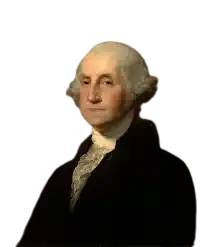Who was the first president of the United States?
Introduction
You’ve come to the right place if you’ve ever wondered, “Who was the first president of the United States?” We shall delve deeply into George Washington’s remarkable life and legacy in this blog. He served as the nation’s first president. Join us as we explore history to learn more about the man who laid the foundation for the incredible history of the United States. By the end of this blog, you’ll have a fresh appreciation for the founding father of our country and know why George Washington’s legacy continues to this day.

Why Check Out Our Blog?
Before we go into George Washington’s life, let’s talk about why you should read this blog. The answer is straightforward: George Washington’s influence on the United States goes well beyond what is documented in history. His leadership, values, and selfless deeds are fundamental to the American identity. Learning about the first president’s biography can help us better understand the nation’s founding, early hardships, and guiding values. You will understand the first president’s significant influence on the country and the rest of the world by the end of this blog, in addition to knowing who he was.
Early Years of George Washington
On February 22, 1732, George Washington’s road towards the presidency began in Westmoreland County, Virginia. He was the oldest of six children and was raised in a wealthy planter family. Young George obtained a fundamental education and surveying training. His upbringing was one of moderate privilege and a hunger for knowledge.
Washington had become known as a capable farmer and surveyor by the time he was an adult. These encounters provided the groundwork for the traits of grit, discipline, and a strong sense of responsibility that would eventually define his administration.
Military Command
Washington’s leadership abilities would be put to the test as hostilities between the American colonies and the British Crown grew more intense. He was named a major general when the American Revolutionary War started in 1775 and eventually rose to the position of Continental Army commander-in-chief.
Washington’s military strength and unwavering commitment were crucial factors in the American colonies’ eventual victory over the British. Both his remarkable crossing of the Delaware River and his leadership during the difficult Valley Forge winters are legendary events in American history.
The Path to the White House
The development of the U.S. Constitution took place during the tumultuous debates, negotiations, and formation of the country that would become the United States. Washington oversaw the Philadelphia Constitutional Convention in 1787, which formed the groundwork for the American government. His power and standing played a crucial role in the convention’s smooth conclusion.
In 1789, George Washington easily won the election to become the nation’s first president. On April 30, 1789, the nation saw a historic occasion when he took the oath of office in New York City.
George Washington's Administration
Washington’s commitment to create a powerful, stable government was a defining characteristic of his administration, which lasted from 1789 to 1797. From the establishment of the presidential cabinet to his two-term restriction, which would become an unwritten rule for presidents until the 22nd Amendment made it law, he established many precedents.
The Whisky Rebellion of 1794 was one of the most important incidents that occurred while Washington was president. He personally led a force of 13,000 militiamen to put down the uprising, demonstrating his dedication to maintaining the law. This action emphasized the federal government’s legitimacy and established a strong standard for the application of the law.
Legacy and Long-Term Effects
As a cornerstone of American democracy, George Washington’s choice to leave office after serving two terms started a tradition of peaceful power transfers. His farewell address contained counsel that is still applicable today, warning against political factionalism and foreign entanglements.
Washington’s influence persisted after his death. He became a representation of American principles, and the one-dollar bill and the quarter feature his likeness. Leaders and individuals alike continue to be motivated by his commitment to liberty, ethics, and the rule of law
Conclusion
In conclusion, George Washington served as the country’s first president, but his impact goes well beyond that. He was a true statesman, a hero in the military, and a key figure in the history of the country. His vision and values helped to mold the early United States and still serve as the foundation for the nation today.
So why should you read our blog? You can better appreciate the origins of American democracy, the hardships of the early country, and the enduring principles that support the US by comprehending George Washington’s life and contributions. The American spirit is personified in George Washington, who is more than just a historical character.
Remember that the first president’s life is a tribute to the strength of determination, leadership, and the pursuit of a just cause as you think back on his tenure in office. Whether you’re a history buff or just curious to learn more about the first president of the United States, George Washington’s journey is a narrative worth understanding.
for more information, visit our website Postdock




